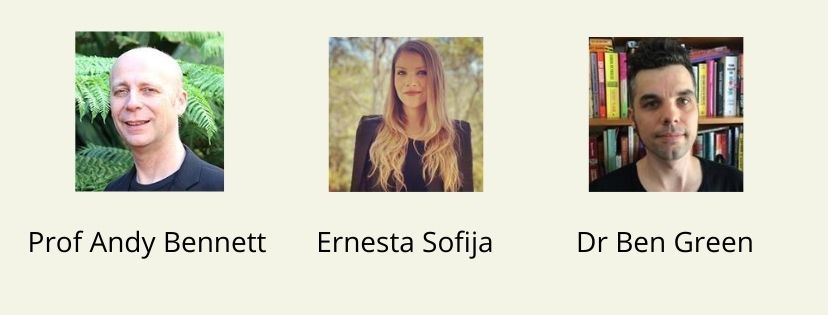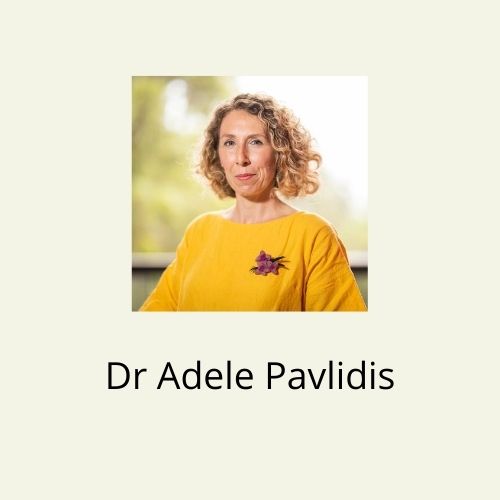Online symposium - Young people, cultural practice and well-being
Hosted by the Newcastle Youth Studies Network in conjuction with the Consortium for Youth, Generations and Culture,this 90 minute online symposium features sociologists and public health academics from both Australia's Griffith University and The University of Helsinki. They will present three papers:
- Youth, music-making and well-being during a public health crisis, presented by Andy Bennett, School of Humanities, Languages and Social Science; Ernesta Sofija, School of Medicine – Public Health; Ben Green, Griffith Centre for Social and Cultural Research (Griffith University).
- Troubled derby subjectivities: sport cultures as cure and cause, presented by Adele Pavlidis, ARC DECRA Fellow, Griffith Centre for Social and Cultural Research (Griffith University).
- Lifestyle sports, well-being and ‘doing otherwise’ , presented by Mikko Piispa, Finnish Youth Research Network and University of Helsinki Doctoral School in Humanities and Social Sciences.
Register via Eventbrite to receive the Zoom link for the symposium.
Youth, music-making and well-being during a public health crisis
This paper presents preliminary findings from a cross-disciplinary pilot project, funded by the Griffith Centre for Social and Cultural Research, that seeks to understand the importance of music-making for young people (between the ages of 18 – 35) as a source of well-being during the COVID-19 crisis. A key objective of the project is to evaluate whether music-making has contributed in palpable ways to young people’s individual well-being and their sense of connection with others. For the purposes of the project, well-being is defined in relation to both physical and mental health. Given the unprecedented circumstances created the COVID-19 pandemic, its rapid spread and ensuing disruptions to everyday life, the project findings offer a significant opportunity to examine and evaluate the importance of music-making for young people’s well-being in a time of rapidly shifting and increasingly uncertain socio-economic conditions. The paper draws on data collected during 20 online interviews with young people based in different locations around Australia. Participants for the project were recruited through calls posted on social media with additional internal recruiting through Griffith University’s monthly call out for volunteers for research projects.
About the speakers

Andy Bennett is Professor of Cultural Sociology in the School of Humanities, Languages and Social Science at Griffith University. He has written and edited numerous books including Popular Music and Youth Culture, Music, Style and Aging and Music Scenes (co-edited with Richard A. Peterson). He is a Faculty Fellow of the Yale Centre for Cultural Sociology, an International Research Fellow of the Finnish Youth Research Network, a founding member of the Consortium for Youth, Generations and Culture and a founding member of the Regional Music Research Group.
Dr Ben Green is a cultural sociologist with interests in popular music and youth studies. Ben is a resident adjunct researcher at the Griffith Centre for Social and Cultural Research and a sessional academic at Griffith University. His research has explored topics of memory and heritage, cultural policy, youth and well-being through ethnographic research in urban, regional and trans-local music scenes. Publications include articles in Sociology, Popular Music and The Conversation with a forthcoming book for Routledge entitled Peak Music Experiences: A New Perspective on Popular Music, Identity and Scenes.
Ernesta Sofija is an early career academic with research and teaching interests in population health, particularly in innovative approaches to health promotion, mental health and wellbeing, determinants of health and evaluation research. Sofija has extensive experience in teaching in Public Health and Health Promotion and developed a research track record consistent with being an early career researcher. She is currently completing her PhD that investigates the role of subjective experiences of wellbeing in shaping lifestyle behaviours among emerging adults.
Troubled derby subjectivities: sport cultures as cure and cause
Roller derby is a unique and innovative phenomenon in the sporting landscape. Body image, gender policies, aggression/contact elements, music, art, and subversive and inclusive politics are all embraced to various degrees. Its growth was swift and significant – thousands of women around the world, including in Australia, strapped on their skates and pushed themselves to meet the minimum skills requirements for joining a derby league. This unique sport was put in an (in)enviable position of somehow having done what governments and medical professionals had tried for years – to get people active that were inactive in the past, to get people to raise physical activity levels, and therefore (so the story goes) improving their overall wellbeing and mental health. This paper engages with interview transcripts with 12 derby skaters who chose to leave the sport to understand the complex social, cultural and personal forces at play. Drawing on feminist conceptualizations of affect I explore the notion of ‘troubled derby subjectivities’ to understand the ways the ‘sport’ (including the style, music and affinities) provided a generative space for non-normative gendered subjectivities and hence ‘wellbeing’, for a time.
About the speaker

Dr Adele Pavlidis was conferred her PhD in 2013 by Griffith University where she currently works in the Griffith Centre for Social and Cultural Research as a Research Fellow. Her work focuses on affective-discursive relations and the ways health and wellbeing are enabled or impeded by a range of sport and physical cultural practices. In 2018 she began her ARC DECRA fellowship which explores the ways Australian sport culture is changing, focused particularly on women in contact sports. She has published two monographs, Sport, Gender and Power: The Rise of Roller Derby (with Simone Fullagar, 2014, Routledge) and Feminism and a vital politics of depression (with Simone Fullagar and Wendy O'Brien, 2019, Palgrave) as well as articles in internationally recognised journals in sport, sociology, cultural studies, and leisure studies.
Lifestyle sports, well-being and ‘doing otherwise’
Lifestyle sports, such as skateboarding, snowboarding or surfing, are often seen as youth cultural practices, emphasising values that differ from ‘mainstream sport’. They are more about 'doing it' than the pursuit of competitive success.
In this paper I approach lifestyle sports as a means of ‘doing otherwise’ not just in context of sports, but in society at large. Through lifestyle sports young people create spaces and fields of practice where they can seek meaningful ways to live, and where they can apply their own set of rules. While lifestyle sports are usually not outspokenly ‘political’, these alternative fields politicise what is being framed as apolitical. Practitioners of lifestyle sports are rarely delinquent for the sake of delinquency, but rather take upon the liberties they have and challenge our conventions of “normal life course”. They bring to the fore that there are other ways to do sports and to live life – ways that also contribute to the well-being of these youth. I draw from two separate analyses: an analysis on practitioners of lifestyle sports in general, data being collected in 2012, and from an analysis based on interview data I have collected among Finnish surfers during 2016–2017.
About the speaker
 Mikko Piispa is a researcher at the Finnish Youth Research Network and a PhD candidate at The University of Helsinki Doctoral School in Humanities and Social Sciences. He has a Masters Degree in Social Science. He is currently conducting research on the political participation of youth in climate issues, and is working on his PhD thesis on the mobilities and utopias of Finnish youth. Piispa has worked at the Finnish Youth Research Network on various research projects. He has published on topics including life course research on elite athletes and young artists, lifestyle sports, recreational doping use, drug related deaths, and artistic work. He also regularly writes on a wide array of subjects popularising sociological and youth related research.
Mikko Piispa is a researcher at the Finnish Youth Research Network and a PhD candidate at The University of Helsinki Doctoral School in Humanities and Social Sciences. He has a Masters Degree in Social Science. He is currently conducting research on the political participation of youth in climate issues, and is working on his PhD thesis on the mobilities and utopias of Finnish youth. Piispa has worked at the Finnish Youth Research Network on various research projects. He has published on topics including life course research on elite athletes and young artists, lifestyle sports, recreational doping use, drug related deaths, and artistic work. He also regularly writes on a wide array of subjects popularising sociological and youth related research.
The University of Newcastle acknowledges the traditional custodians of the lands within our footprint areas: Awabakal, Darkinjung, Biripai, Worimi, Wonnarua, and Eora Nations. We also pay respect to the wisdom of our Elders past and present.